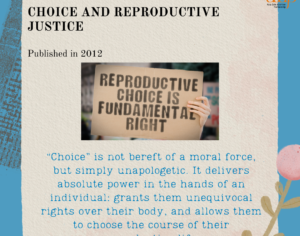Choice and Reproductive Justice
Choice resonates most with women who see themselves as having choices; not with those who don’t.
– Marlene Gerber Fried, 10 Reasons to Rethink Reproductive “Choice”, Different Takes, Fall 2008
Across Asia, several women are driven by poverty alone to seek abortion. Pregnancy could cost them their jobs, and an extra mouth to feed could jeopardize the lives of their existing children. Similar predicaments affect people all across the globe, and in her essay 10 Reasons to Rethink Reproductive “Choice”, Marlene Gerber Fried founder of the National Network of Abortion Funds (U.S.A.) emphasizes the need to represent the rights of oppressed and poor women, for whom abortion may be more a need than a choice.
She quotes Native American activist, Justine Smith on the issue: “If a woman has an abortion because she cannot afford to have a child she would otherwise want, is that a real choice?”
Fried urges everyone to endorse reproductive “justice”, and argues that “choice is a market concept,” a word created in capitalistic societies that grant their consumers the right to choose. She writes that it lacks a moral force, and leaves room for conservative societies to pit “life” against “choice” in debates on abortion.
Fried’s essay lends an authoritative voice to a larger movement for reproductive rights organized by colored and oppressed women in the U.S. These groups have criticized the mainstream movement for being classist, and excluding those women for whom “choice” is still a privilege they can seldom afford.
In South and South East Asia, the need for such reproductive “justice” is imperative. According to the World Bank, South Asia is home to half of the world’s poor, and in some countries like Bangladesh, 50% of the population lives below poverty lines (income less than 1.25 USD/day). Women in these regions are either unaware of contraception, use these devices irregularly, or are bound by religion to shun them entirely. While large families become an economic strain, multiple pregnancies affect a woman’s overall health, and not uncommonly lead to death.
Also, when it comes to women in patriarchal societies, economic oppression and the need for reproductive “justice” transcends class. A large number of upper and middle class women are financially dependent on their families, and unable to having a “choice” in their reproductive lives. These women are mostly told when to get married, and when to begin a family. Some of them are forced to have abortions, and other forced to give up viable careers to start families.
But should one really omit “choice” from discussions on reproductive health, and adopt “justice” instead? Maybe not. It can be argued that “choice” is not bereft of a moral force, but simply unapologetic. It delivers absolute power in the hands of a woman: grants her unequivocal rights over her body, and allows her to choose the course of her reproductive life.
Hopefully, as social justice is incorporated into pro-choice movements, these “choices” will begin to resonate with all women.







